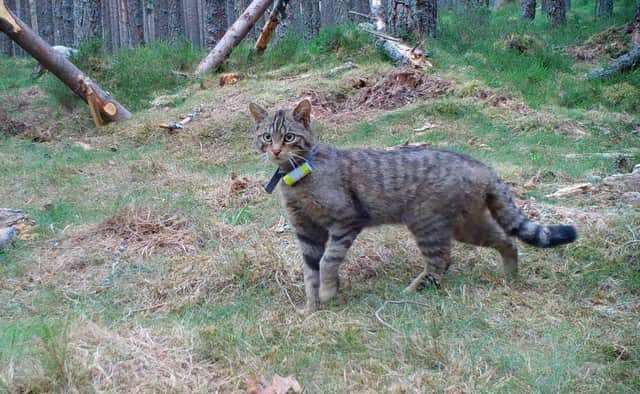Three wildcats ‘not fit to release into wild’


A total of 22 wildcats were expected to be set free in the Cairngorms Connect landscape of Cairngorms National Park in the first phase of the multi-million pound project.
However, only 19 of the animals born last year for the project were able to take part in the first ever conservation translocation of wildcats in Britain. The remaining three failed to pass "extensive health and disease screening".
Advertisement
Hide AdAdvertisement
Hide AdOne female wildcat was judged "not fit for release" due to illness. The other two -- the youngest of the group born last year -- were found to be underweight.
A spokesperson said: "Prior to the release of every wildcat, our experienced veterinary team assesses the individual to determine whether it should be released into the wild.
"This involves an extensive health and disease screening as well as weight and body condition assessment to ensure they are ready for life in the wild.
"This information is combined with behavioural data that has been gathered over the past year from our experienced animal management team and is used to determine whether they will be released."
One of the wildcats had "a gastrointestinal malabsorption disorder" which was being treated and investigated further.
The two others did not meet the "body condition threshold" set by the project's team of vets, who were concerned that releasing the pair could "expose them to a heightened number of risks due to their low weight", particularly at the end of summer when prey availability naturally decreases.
The spokesperson added: "These individuals are the youngest of the cohort of kittens born last year.
"They may be eligible for release next year, by which point they will have had plenty of time to put on weight, increasing their likelihood of survival post-release."
Advertisement
Hide AdAdvertisement
Hide AdScottish wildcats, also known as "Highland tigers" are on the brink of extinction in Scotland due to historic habitat loss and hunting, together with the more recent threat of hybridisation due to interbreeding with domestic cats.
The Saving Wildcats conservation partnership, led by the Royal Zoological Society of Scotland (RZSS), selected animals for breeding at the charity's Highland Wildlife Park near Aviemore.
The first generation was released this summer under licence by NatureScot, with 19 cats let loose in small clusters at undisclosed sites following a period of acclimatisation.
One of the animals has already been confirmed dead. Its death was revealed after a GPS collar fitted to allow researchers to track its whereabouts indicated it had stopped moving. The animal's body was recovered and a post mortem found it had died from peritonitis, an infection in the abdominal cavity.
Experts said the releases had been a success, however, and it would be "highly unusual for all the released wildcats to survive the first year, even with the project’s careful preparations".
It is anticipated that around 60 wildcats will be released as part of the scheme over three years. A total of 13 kittens have been born this year at the project's breeding for release centre. Once these kittens reach six-to-eight months they will be transferred to pre-release enclosures to prepare for release into the wild next summer.